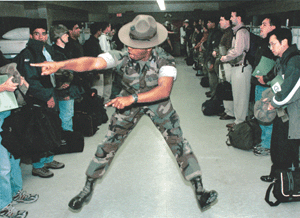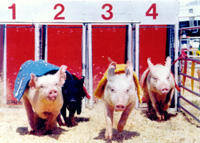Folks, I don't know if this is true or not but I found it amusing.
Snopes has nothing on it.
On May 19th, I was one of thousands of people around the country who received a 'junk mail' letter touting a get-rich quick method for making $95,093.35 in just three weeks. That letter also came with a check for the same amount, $95,093.35. Everything about the check looked real except for the words 'non-negotiable for cash' typed on the top right hand corner.
For very little reason at all I deposited this check into my ATM. It was fun, like putting monopoly money into the bank. I walked home picturing a bank teller opening my deposit envelope and chuckling upon the sight of the ridiculously large, and obviously a sample, check. I fully expected that on Monday morning someone from my bank would call and say, 'Mr. Combs, the check you deposited on Friday wasn't real.'
On Monday when they didn't call, I figured they were mailing the check back to me and I forgot about the whole thing. Then two days later, while withdrawing $40, my ATM produced a receipt that stated my balance at over one hundred thousand dollars! Suddenly, I remembered the $95,093.35 deposit.
I walked briskly and excitedly home. As soon as I got in I called a friend and told them what'd happened. He made a quick phone call to his own bank and called me back: "It's standard policy to credit your account for any amount you deposit, but it's only a credit. You can't touch the money unless the check clears." Of course -- It was just a matter of days before the bank would erase the credit and return my account to a mere $5,000.
For the next two days I called my bank for my account balance. It remained over a hundred grand.
Friday morning I again called for my account balance. Still no change.
Curiosity kicked in. I went to my bank, approached a teller, and posed this
question: "If I need a cashiers check for $70,000 later this afternoon do I have the funds available?"
The teller typed my account number into her computer and said, "Yes, the money is available." -- I got out of the bank fast. And I felt supercharged with possibility and shock.
From that moment until the next Wednesday when I boarded a plane for a four day career-counseling conference in Orlando FL(I make my living as an author and speaker addressing career success), $95,093.35 was available for withdrawal from my account. My close friends and I contemplated, for fun, all the possibilities a hundred grand afforded. "To Leave the Country or Not To Leave -- That is the question."
I knew that the money was going to be taken out of my account -- and each day I figured it would happen tomorrow. I boarded my flight to Orlando confident, and glad, that in all likelihood the money would be gone upon my return. It had already possessed my thoughts for a week.
On Monday, the day after my return, I called for my account balance. Five thousand and something dollars was what I expected to hear. No such luck.
"What's happening here!!!"
Two weeks and that money was still sitting in my account. "It will be gone tomorrow," I kept telling myself for the next five days. Then on Friday, exactly three weeks since I had deposited the sample check I, again, returned to the bank. I approached a bank teller at the special Customer Service window, and I sternly stated: "I recently deposited $95,000 and I don't want to spend any of the money if there is the possibility of the check being returned. How long should I wait?"
Again the teller keyed in my account number. Then she said, "$95,093.35 deposited on May 21st. You're safe to spend that money now because that check can no longer be returned. Depositors are protected by a law that says checks cannot be returned after 10 business days." I couldn't believe my ears. I couldn't believe my luck. I couldn't believe what was happening to me. On my way out of the bank, I grabbed every brochure and pamphlet that vaguely implied it might contain the law she had just referenced and I went home and read voraciously.
My reading didn't reveal the law I was looking for. Quickly I learned that bank brochures don't tell you your rights -- they tell you all the bank's rights. (Some of which I found quite interesting). But at the end of one of the brochures I found a reference that said, "For more information contact, The Office of Thrift Supervision." (O.T.S)
I called the O.T.S. and a man answered the phone. I gave my first name only and I gave him a quick synopsis of what had transpired. He treated my story with a cool intrigue. He told me that the ten day law the teller had mentioned was known as "The Midnight Deadline." But he suggested that the more important legal question had to do with "negotiability." He wondered if the check I deposited was a true negotiable instrument. He said, "The banking law book, Bradys, has specific criteria that a check has to match in order to qualify as legal negotiable instrument. I'm not sure what they are but if the check you deposited was actually a negotiable instrument that would explain why your bank passed it."
Within three hours I had found my way to the Hasting's Law Library and to the book, Brady on Bank Checks - The Law of Bank Checks by Henry Bailey and Richard Hagedorn .
Uuggh! Reading a big thick law book. Suddenly I knew why law students always looked so beat and tired. I didn't know how I was going to find anything in the monstroserous tome in front of me, and then my eyes caught sight of a small pocket sized book titled, Negotiable Instruments and Check Collection . It was a heaven sent guide for laymen. And plain as day, it listed the nine criteria for a negotiable instrument. I flipped it open and as if by magic, I found myself staring at a page that read, "The Nine Criteria for a Negotiable Instrument." I dove in reading with ferocious intensity.
The first eight criteria went my way. Things like, must have a signature, a date, the words "pay to," - all the things you expect to see on a check. The check I deposited had all the right features however it also carried the words "non-negotiable" in the top right hand corner. Hopefully the ninth point would address this. It said, "The ninth issue is whether people can create an instrument that matches the first eight criteria, and then avoid negotiability by declaring on the instrument that it is not negotiable."
I took a deep breath. The roulette wheel was spinning to a stop, giving me a fifty-fifty chance at a hundred grand. I began reading the next sentence slower than any sentence I've read in my life, my finger uncovering one word at a time. "No, give me the word no," I said to myself.
"The... answer... is... ...yes."
Wham. Ugh. Game over.
Any fantasies I had about the $95,000 dollars fizzled. But then, I moved my finger a micro-inch further, and saw a comma. "The answer is yes, except on a check." It went on:
"A declaration on a check that it is not negotiable is ineffective." The meaning of this sunk in quickly - I was the luckiest S.O.B. alive. The get-rich-quick company had accidentally designed a real check - and I had deposited it!












